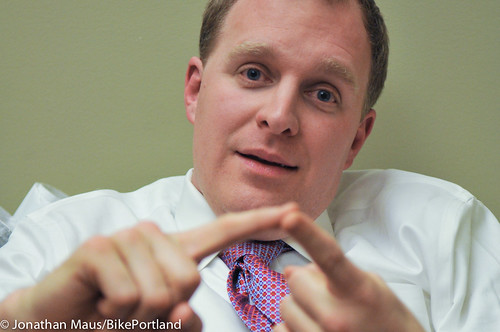
Jefferson Smith (he goes by Jeff) is the latest mayoral candidate to sit down with me for a chat about the politics of bicycling and transportation. Smith, 38, is the founder of The Bus Project and was elected to the Oregon House of Representatives in 2008 (representing east Portland).
“Figuring out the cultural connections with active transportation and bicycling is one of the most important challenges we have to embrace.”
“I use a lot of things. Now that I’m running for mayor it tends to be a dictatorial carpool… I’m told where to be by my campaign team and we generally car-share. Living in Hazelwood [between Halsey and Glisan near 115th], we have a longer commute to Central City. We have bikes, we walk, but we use cars more than we ought to.”
“It comes up, and probably too often in not the way you and we would want. I think there was a question on the Portland Business Alliance questionnaire that boiled down to: ‘68% of Portlanders believe that living wage jobs are more important than bike lanes, do you agree?’ My impression was that 32% of the people thought that was a stupid question and that those aren’t the choices.
I think there is some communications work that needs to be done. We need to frame — and clarify the frame — around active transportation in terms of safety, in terms of cost savings, in terms of health, in terms of equity, as well as in terms of climate change and everything else.”
“I think it’s a winner or a loser either way. I mean, if somebody were to run on, ‘I love bikes!’ there would be a bunch of people who would say, ‘Great!’ If you said, ‘Too many bike lanes! let’s get back to basics!’ I think there’d be a base of supporters saying ‘Great!’ The good news about that is that it makes it even more clear that a candidate should follow the facts and follow their best judgment and have politics and political power considerations be the servant of our best ideas and our best values rather than crafting our ideas and our values around wherever the political power happens to be.
I have to say… one of my favorite things about this city, is to some degree, we are a city where you have to pander to bicyclists, and that’s pretty cool.”
“Over time, we’re not doing enough. I think our commitment is roughly about where it ought to be. I think the fact that we have an active set of people advocating for active transportation and bicycling is extraordinarily important. My favorite economist in town is the one who says that this city should play to its distinctive strengths and when I go to other cities in this state and in this county and abroad, what I hear about Portland is not that it’s the best place to drive around an F150 but that it’s an easy place to get around — and it’s easy for someone to save $5,500 a year — by choosing to not own a car. That’s I think one of our significant distinctive strengths. I think where we need to go in terms of communications is make sure we win that argument, and not by drawing lines or increasing division but by clarifying where we are and where we’re going.”
“Actively.”
“Let me share my thoughts on the first part. Where does it come from? Several places. Some of it’s cultural. Some of it is the reality of the area. I think there are about 28 percent of Portlanders that use active transportation. In east Portland it’s closer to 11 or 12 percent. What’s more surprising about that number is that we have more seniors, more children, and more low-income people which normally would correlate with a higher percentage of active transportation use. So why don’t we?
“And on Holgate, the critics I know are not anti-bicycle, they’re people that don’t ride bikes! Where are they going to ride it to?!”
I think some of it is cultural… I think some of it is, we have more people who are physically tired at the end of the day, so riding a bicycle isn’t as appealing. I worked as a cattle hand in high school, so the idea of riding a bicycle after working as a cattle hand all day didn’t seem very attractive. The other thing is just the reality of our built space. Connectivity is much harder. You have faster moving traffic; moving north and south is much harder. If you’re going to the Central City, it’s further away. It takes a bigger commitment. We’ve had reduced bus service as TriMet has reduced service with budget cuts, it makes it harder to manage one’s schedule.
Some of it I think is political bluster. People wanting to find somebody to whack and complain about on talk radio, so why not fluffy-hearted Birkenstock-wearing-bicyclists? That’s some of the challenge.
In terms of what do we do going forward? I’ll tell the story of my brother in law. He plays baseball, wears his cap backwards, drinks Coors Light — he’s part of the 99 percent, but not entirely in favor of it. And, if I say to him, ‘Hey don’t you want to do more stuff about climate change and impacts on the environment and be more like Hawthorne?’ He’d say, ‘What are you talking about! Those people are ruining this neighborhood.’ If I say, ‘Hey, your daughter Adrian, she’s now 7 years old, and we had three kids die in five years on bikes on 122nd Avenue alone. Do you want her to die on a bike ride? Or do you want her to be a little bit safer when she’s on her bike? Do you want more eyes on the street for better community safety? Do you want an economic development plan beyond strip clubs and strip malls?’ And he’s like, ‘Yeah I guess.’
So some of it is I think the way we communicate about it. Another is source and messenger.
“Yeah. for instance If you did a poll right now and asked Portlanders, on average, what percentage of PBOT budget ought to be spent on bicycles, my guess is that the answer they’d give would be higher than the percent we’re spending now. They’d say 25-30 percent, maybe more. But we’re only, what, 5, 5 1/2 percent? So I think communicating the reality and leading with candor can be helpful.”
“I would think in terms of arterials second; place first. Part of our challenge when I say the built space is that we have fewer shorter trips out in east Portland. Fewer people that are going to a really close supermarket. There’s no Whole Foods, there’s no New Seasons east of 60th. We have a lot more big box retail, we have a lot more drive throughs. Too much of our transportation investments, our planning investments, was for east Portland to be a place that you move through, rather than a place that you went to, or moved around.
So we need to be thinking about not only arterials, but how do we make it a place that has places that people go to and want to move around? And on Holgate, the critics I know are not anti-bicycle, they’re people that don’t ride bikes! Where are they going to ride it to?! There’s a bike lane but nobody’s using it! And, so simultaneously investing in transportation options as we make sure our city works for everybody.”
“It’s about aggressive balance. First, let’s not think of our transportation investments without also think about our planning decisions. It’s really important. Part of what’s happening is that people were building stores in inner N/NE Portland having no net loss of housing agreements and then not building the housing nearby, but building it in east Portland. Now we have 12,000 members of minority communities who’ve moved from inner northeast Portland to outer east Portland. I’ve got constituents who vote for me who live in east Portland and commute to north Portland to go to church.
What that means is, being able to make the case for a particular bicycle project being linked to something else that’s happening; like to a main street project or to a new park project, so it seems to make a little more sense and when we’re going around and saying, ‘Here’s what we’re working on, we’re doing this and this together.’
“Figuring out the cultural connections with active transportation and bicycling is one of the most important challenges we have to embrace. Our city is changing. demography is changing. It’s not getting whiter. 73 languages are spoken in my school district. There are fewer of my constituents that think of bicycles as the way they’ll get around. But I have a lot of constituents who, if they could save $5,500 a year by not operating an automobile, a lot of my constituents could really use an extra $5,500 buck a year! Aggressively seizing those cultural opportunities are one of the most important things we’ve got to do.”
“Change? Yes. Fundamental? I try to avoid adjectives.
It requires using an opportunity. We need to explore a city, maybe regional, city transportation package. Looking at balanced funding mechanisms and balanced investments. It does create that opportunity whether it’s from parking or whatever. The good and bad news is that gas tax revenue is less than we would think. The good news is that anybody who hopes that we’re using more and more gas isn’t paying attention to what’s happening with gas or what’s happening with the planet. The bad news is, if we have lots of systems that are dependent on the gas tax and what happens with gas if they use less is we’ve got a structural funding challenge. That is maybe only restating your question, but that creates a neccessary challenge and opportunity.
“There are 3 ways to handle budget challenges: Grow the economy, cut services, increase revenue. I believe in all three.”
“What’s the estimated direct economic impact of bicycling? About $90 million in Portland? And according to another economist, because the average Portlander travels four miles less a day in their car that boosts as much as $800 million in the local economy? So I think that if we think in terms of an economic strategy that plays to our distinctive strengths than we should think about bicycle use.
“Some of it is how we think about economic development and the piece I want to add to our strategy and thinking is re-focusing not just on recruiting out of state business but towards developing and incubating home-grown business. And, in a world facing global climate change and peak oil, being a city that builds an international reputation for the best bicycle parts and the best active transportation accoutrements is a potential significant strategic advantage.
So much our conversation is about attraction, or economic hunting; we need to increase the portion of our conversation about cultivation, or economic gardening. One way to do that is by helping homegrown businesses access new customers and new markets. So, if we can continue to improve the culture at PDC [Portland Development Commission] and our various economic development arms towards helping our 1st and 2nd stage businesses go from pretty good to good or from good to great, our bicycle industry is a classic place where we might be able to do that.”
“Hi, my name is Jefferson Smith (reaches out for a handshake).”
“What I am wanting to say about not only the CRC but just about everything, is that we need to be making decisions less about the tug and pull of political interest and more based on facts. The only thing I promise is that I will do my best to tell you what I think, and I will try to gather the best facts to think the best thing that I can.
I have tried to be clear about a few things. 1) Be honest about where we are with the financing of the project. I’ve tried to be consistent in how we talk about it, almost to the point of repetition and nausea; but I see four important income streams to the project: $450 million from the state of Oregon, and I don’t see 36 votes for a gas tax increase any time soon and it’s not clear to me there is $450 million in existing projects we’re going to set aside; $450 million from the state of Washington and talking to an acquaintance of mine in the Washington House, they’ve got three mega-projects ahead of this in a queue so they’re not touching the CRC for a few years; I see one dot blank billion dollars from a Tea Party congress I know doesn’t want to give it to us and I see our own treasurer saying the tolling math doesn’t add up.
And I add not one, plus not one, plus not one, plus not one, and it doesn’t equal four.
Even that level of candor creates significant political risk. The other thing I’ve tried to say is listen, if I’m wrong, I don’t know if it’s going to matter very much, the city council has already voted on this. If I’m right and we have to look at how to adjust, maybe a plan b, then you have a right to know what I’d prioritize. What I’d prioritize is freight mobility and safety and what I would de-prioritize is interstate and local commuting and in particular, single occupancy vehicle travel.
It’s not a bridge that’s the expensive part. We could retrofit this bridge for $200 million — tearing it down costs $180 million, and we could build a new one for $700 million, a fancy one for $900 million — what’s expensive is all the other stuff. And I don’t pretend to be an engineer, but I want us to make the decision based on facts and be careful before we spend a whole lot more consulting dollars without confidence that we’re going to solve the problem.”
“Two reasons: One; because there legitimate concerns that project promoters are addressing. I too have tried to drive to Camas at the wrong time. we really do have trucks that have a hard time moving not only from Portland to Vancouver, but from LA to Seattle, because of our bottleneck. We really do want construction jobs and we should do nearly everything we can to boost construction jobs.
Second is political power. There’s a lot behind this thing. One of the challenges of democracy is that there’s too little influence organized around the public interest and most of it is built around more identifiable, very largely financial self interest and it is left to a too small handful of fluffy hearts to make sure sunlight gets in.”
“Yeah but most of the cost is in materials. If you want jobs do something that is mostly jobs! So far we’ve created consultant jobs. So far it hasn’t been a bunch of east Portlanders building stuff. If we want to do a project, let’s do a project that’s a doable project. Let’s make sure we’re applying our resources to our biggest priorities.”
“I made a promise when I was running for the House that I would not vote for a gas tax increase unless it did two things: One, that somewhere in the package, if we were going to make it more expensive for people to drive, it was going to make it easier not to have to; and second, it had to be good for my district. The package failed both tests.
Portland got very little out of that deal. The average dollar per Portland resident was a small handful. It was big road projects to serve suburbs and Portland wasn’t getting anywhere near its share. There didn’t seem to be nearly enough that was making it easier for the people in my district that were going to have to spend more to drive to make it easier for them to not have to drive. It failed both tests. It was the hardest vote I took in my first session. It was the speaker’s top priority… I didn’t give a big speech or try and make a big stink, I just didn’t want to be a liar.”
“No, I just think we need to do it better. I’ve heard on this campaign, ‘We have too much process! We need leaders who will make decisions!’ And I agree that leadership requires decision making and you’ve gotta make a call; but one of the hallmarks of this city, the greatest strengths of this city is, to a greater degree than other places, the people rule… And that is a principle worth dying for. It’s certainly a principle worth ending a political life over.
Now, what do you do to make it better so it’s not just an endless string of boring meetings that don’t yield anything? That’s a good question. I think there are ways to improve our processes. If you’re going to have a group that’s working on a problem, set out some of the boundaries early. If you don’t want the Memorial Coliseum to be a shopping mall, say at the front end of the process, it can’t be a shopping mall!
Also, put together the people who are not only the coalition of the willing, but are the coalition of folks who are going to get something done; who have some common purpose to accomplish some objectives. And third, use input. Use their input, don’t just put whatever they think in an Internet file. There are ways to interact with our population better. We still do much of our civic engagement process pretty similarly to what we did 20-40 years ago. There’s got to be a way to do that better. I think there is, and I think this city can lead the way.”
“Somebody said something to me once; that the only ideology I’m sure of is civic engagement. The only thing that I know in a democracy has to be true is the that we govern based on the consent of the governed. We don’t have a direct democracy for everything, but we are here to serve people, not rule them. That’s fundamental.
Second, we have a really smart, committed city. We have a wealth of information and wisdom. We need to tap it… All of us are smarter than any of us, and if we can find the best way to legitimately and more quickly crowd-source the best answers we can come up with much better answers.
The questions isn’t more or less, it’s not civic engagement versus decision making; it’s about having an absolute commitment to people-based governance and then trying to be an international leader in how to do that best.”
“Bicycle transportation can win if we make decisions based on facts. Having a commitment to making decisions based on facts has overlap with that. Having the sensitivity to be able to communicate about these things from a frame, not of my own personal preference because I’m trying to impose a particular lifestyle that I choose on others, but because I’m just trying to help us figure out how we can make things work. And I just can’t do the math on climate change, on energy use, on health, on safety, on a local economic development, on population… I just can’t do the math on any of those things if I don’t include bicycles and I think I’m an interesting messenger .”
“We need to set an international example for non-auto dependent transportation. I don’t say that because of ideology. I say it because of facts and of math and of an economic strategy. This is our play. We are not going to compete because we’re Phoenix with rainier weather. We’re going to compete because of our distinctive strengths; and the way we can move around our city and our reputation for doing that is one of our most distinctive strengths.”
“That I can do this job. That I am the only candidate in the race who has actually started and run an organization. To pick staff, manage a budget, plan objectives and meet them. And I mix that with recent electoral political experience of getting some pretty hard things done and being elected and re-elected to House leadership by my colleagues and having some sense of what it takes to work with and manage politicians, which is different than operating as a military general or a corporate CEO. You don’t have the same carrots and sticks of hiring and firing… But you need to get people on the same side of the table approaching a common problem.
One thing I want to say is I can do this job. But I can’t do this job alone. Portland is a wonderful place and will continue to be a wonderful place because of its people. I can’t make this place the place it aspires to be. But I can help. I can do that job.”
“We’re all in this together. We shouldn’t be looking to elect anyone to solve our problems… I’m not going to be able to do all of the things that need to get done, but I can help. I can do that job. What I most want is not the votes of whomever is reading or their campaign contributions or their volunteer time — although I want all three of those things — what I most want is a common commitment for this to be a city that sets an example for the world of what a city can be like and vigorous energy applied to that commitment not just during this election but after this election.”
— Learn more about Smith on his campaign website. For more on the mayor’s race, read our interview with Charlie Hales. And don’t forget to attend tonight’s mayoral debate on Active Transportation at PSU.



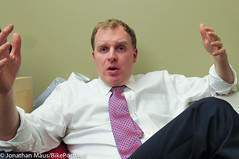
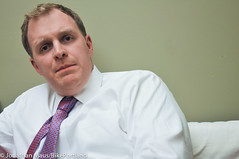

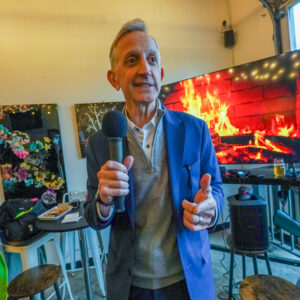
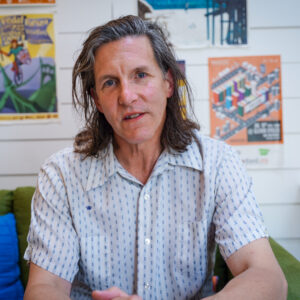

Thanks for reading.
BikePortland has served this community with independent community journalism since 2005. We rely on subscriptions from readers like you to survive. Your financial support is vital in keeping this valuable resource alive and well.
Please subscribe today to strengthen and expand our work.
Interesting interview. If it tells you anything about how political I am (or not!), my favorite line was the one about “fluffy hearted” cyclists. I’ve been called lots of things in connection with my riding, but that’s a new one. Love it!
Soooo, has Jeff ever ridden a bike?
He should start a new organization – the Oregon Bike Project!
I note that your comment at 12:10 AM shows you’ve put more thought into this, but I have to ask: If the answer were no, he’d never ridden a bike and yet his positions were those outlined in the interview, then does it really matter?
Q: Have you ever ridden a bike?
A: No, my legs were amputated following a car crash when I was three.
Q: I can’t vote for you then…
Alexi Grewal for mayor, then!
Another great interview Jon. Love that you are providing some real opportunity for the candidates to show (or not show) real depth on active transportation and related issues.
Missing the debate (forum?) at PSU. Look forward to seeing your write-up from you on it.
And yeah, Smith hits all the high notes for me. Realistic focus on the budget challenges and the need to reshape the discussion plus an authentic focus on growing the local economy from the grassroots.
Effectively adopting a people-centered approach to governance requires some real credibility, I think Smith has it.
Thanks for doing the interview, Jonathan. I’m impressed and look forward to having him as our next mayor.
Wow. I’m impressed how much he seems to talk yet say nothing at all. He did manage to make sure all the catch phrases were covered. I’m glad that we are all in this together and that he will bring people centric governance to the city.
Really? You read that detailed response on the financing of the CRC, the 12,000 displaced folks to East Portland, the explanation of his vote on HB 2001, the anecdote about his brother in law and framing things and think he’s saying nothing?
You forgot to ask about bicycle access to Forest Park singletrack!
Clearly the top issue these days is converting the waterfront into a permanent cyclocross venue. Priorities!
Great interview, Jonathan. Jeff is clearly in favor of making active transportation part of Portland’s transportation policy–not giving up on it in a false choice between jobs and a good transportation infrastructure. Go Jeff!
After tonight’s forum Jeff was clearly the most on the ball. Talking about NO-(new)-CRC options definitely hit the right note, as did pedestrian infrastructure, which is sorely overlooked in the bike/bus/rail conversation. Plus rejecting the jobs jobs jobs mantra that every politician without a real plan resorts to was a win for Jeff too; if people want to move here because it’s a rad place to live, jobs will follow, not the other way around.
Before even reading the article, I have to say that lead in photo is hilarious. Jefferson Smith phone home…
Surprised to read one of the most balanced pieces yet from the O on the politics of active transportation:
http://www.oregonlive.com/mapes/index.ssf/2012/02/portland_mayoral_candidates_co.html
He’s probably an o.k. guy, but some of the things he says are odd, maybe a mixed message. Check out the whole bit under ‘Q: So, given that, do you think politically speaking, bicycling is a strong issue right now?’, particularly how he winds it up saying that Portland is a city where cyclists have to be pandered to. The word ‘pander’ doesn’t generally have a positive connotation.
His entire answer to this question:
‘Portland is known as a biking town. From an investment and policy standpoint, do you think we’re doing too much, not enough, or just the right amount to make sure that bicycling is a viable transportation option?’
…is unclear. What ‘argument’ is he talking about? Doesn’t seem to have identified one in his answer.
His answer to the question about arterials: I think I understand what he’s trying to say about ‘place’ being a higher prority than arterials, but his answer suggests he might not yet understand the relationship of arterials to place and the significance of bike routes and bike lanes on the arterials.
I’ll leave off further critiquing of Smith for now. Seems to be a likeable guy with some possibly good ideas, but I think he’s gonna have to clear up those ideas and his message if he ever expects to get elected. If he does get elected, he’d never get anything done in city council with the kind of answers he’s given to this interview.
No mention of his horrible driving record (speeding, driving while suspended, etc.)? Some may say its irrelevant, but I’d prefer a mayor who, when advocating that “what I most want is a common commitment for this to be a city that sets an example for the world of what a city can be like,” you know, actually sets an example as a responsible road user.
Great Interview Jon– I love that you pushed him to clarify what he means when he launches into political soundbite (especially your push on the action instead of the stats). I’m a fan of Jeff and I look forward to hearing more from all the candidates.
Thanks for that very in depth interview, Jonathan. Keep up the good work.
Awesome interview, really enjoyed this one. By chance, is their video footage of the active transportation debate?